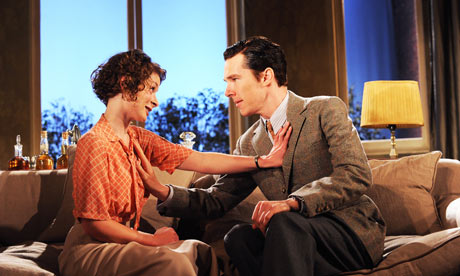National Theatre's revival of 1939 drama is night's biggest success, alongside Legally Blonde and Stephen Sondheim
- guardian.co.uk,

A Terence Rattigan
play that closed early and was largely neglected for 70 years until its
revival at the National Theatre emerged as the biggest winner at last
night's 2011 Olivier theatre awards. After the Dance, which
portrays a group of bright young things getting older but still drinking
and partying as the nation slides to war, won four awards including
best revival. The National was the biggest winner, with seven prizes
overall. This is Rattigan's centenary year and there are revivals of his
plays across the country, including the wartime tearjerker Flare Path,
which opened to loud audience cheers last week.
Last night's other big winners at an unashamedly showbizzy ceremony in the West End were Legally Blonde, the Musical – and Stephen Sondheim.
After
the Dance opened in June 1939 to good reviews but closed early as the
country's mood changed, and it has been staged only rarely since. The
play's director, Thea Sharrock, said it had not been easy to get such a
little-known play staged. The National's Nicholas Hytner initially
declined. "He said: 'No, I don't think so, but let's try and find
something else.'" Hytner changed his mind after re-reading the play. "At
which point I got really nervous and said: 'Can I go away and think
about it?' By hook or by crook it happened," she said.
Its four
awards included best actress for a pregnant Nancy Carroll, whose
portrayal of the socialite Joan Scott-Fowler was described as
"magnificent" by the Guardian and "almost unbearably moving" by the
Telegraph.
Adrian Scarborough won best actor in a supporting role
for his performance as a drunken hanger-on, and Hildegard Bechtler won
for best costume design.
The National won three awards for its
production of The White Guard, including best director for Howard
Davies, best lighting for Neil Austin, and best set design for Bunny
Christie.
One of the strongest-contested categories was best
actor, with Derek Jacobi nominated for King Lear and Rory Kinnear for
Hamlet. The winner, from a shortlist that also included Mark Rylance and
David Suchet, was Roger Allam as Falstaff in Henry IV parts 1 and 2 at
the Globe. He called the role "a middle-aged man's Hamlet" and paid
tribute to the Globe's pricing policy, which includes many £5 seats. "I
remember as a teenager going to the Old Vic when Laurence Olivier was
running the National Theatre and being able to sit on a bench for 15
pence. The price of a tube fare. I saw Olivier, for goodness sake,
playing Shylock for 15 pence."
The portrayal by Sheridan Smith of
the sorority queen Elle in Legally Blonde won her best actress in a
musical. Jill Halfpenny, who played hairdresser Paulette, won best
supporting performer in a musical, while the production itself won best
new musical.
The production seems to be doing better in London
than it did on Broadway. "British audiences just took to it," said
Smith. "It's credit crunch, terrible weather and all you want to do is
have two and a half hours of escapism."
Sondheim, who turned 80
last year, was presented with the equivalent of a lifetime achievement
award by Cameron Mackintosh and Angela Lansbury, while productions of
his work also took prizes. Into the Woods, at the Open Air Theatre in
Regent's Park, was named best musical revival, and David Thaxton won
best actor in a musical for Passion at the Donmar Warehouse.
As
widely tipped, Bruce Norris's Clybourne Park, which opened at the Royal
Court before transferring to the West End, won best new play. The
theatre won three prizes in total, with Michelle Terry named best
supporting actress in a play for Tribes, and Leon Baugh taking the
theatre choreography award for Sucker Punch.
Organisers of this
year's ceremony had tried to give it more pizzazz. It was held in the
Theatre Royal, Drury Lane, rather than a hotel ballroom, with
performances by entertainers including Barry Manilow. It was also
broadcast live for the first time, via the BBC's red button.
The awards were decided by panels, apart from an audience prize voted for by Radio 2 listeners which pitted long-running musicals
against each other. We Will Rock You emerged as the winner from a list
that included Jersey Boys, Les Miserables and Billy Elliot the Musical.
The Railway Children, which was performed at Waterloo station, won best entertainment.
There
had been annoyance among the dance community that the shortlist for
outstanding achievement contained no actual dance performances and the
winner last night was the artist Antony Gormley, for his set designs for
Babel (Words) at Sadler's Wells, a show that also won best new dance
production.
The German baritone Christian Gerhaher won an
outstanding achievement award for his performance in Tannhäuser at the
Royal Opera House, while OperaUpClose's La Bohème at the Soho Theatre
sprang a surprise by winning best new opera production. The show, which
originally played to 35 people at The Cock Tavern, beat productions at
the Royal Opera House and Coliseum.
Soho Theatre's Steve Marmion
paid tribute to the awards for helping promote such productions at a
"time of enormous ideological and brutal cuts to the arts."
The
Lyric Hammersmith's revival of Sarah Kane's Blasted won outstanding
achievement in an affiliate theatre, while the Donmar's King Lear won
for sound design.

No comments:
Post a Comment